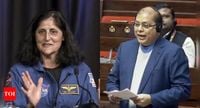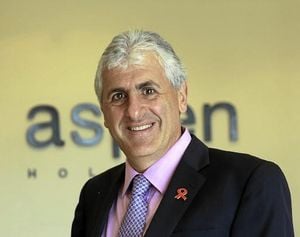In a spirited session of the Rajya Sabha on April 2, 2025, Trinamool Congress (TMC) member Mohammed Nadimul Haque made a passionate appeal for Indian-origin NASA astronaut Sunita Williams to be awarded the Bharat Ratna, India’s highest civilian honor. Williams, who returned to Earth on March 18 after an extraordinary nine-month mission in space, has been celebrated for her achievements both in India and internationally.
Haque's remarks came during the Zero Hour of the parliamentary session, where he highlighted the significance of recognizing Williams' contributions to space exploration and her Indian heritage. He stated, "Giving her Bharat Ratna would be the ultimate celebration," emphasizing that such recognition would not only honor her accomplishments but also bring pride to the Indian Space Research Organisation (ISRO).
The TMC MP noted that West Bengal Chief Minister Mamata Banerjee had previously echoed this sentiment, advocating for the conferment of the Bharat Ratna upon Williams as a fitting tribute to her remarkable achievements. Haque described Williams as a "super achiever with strong Indian and Gujarati roots," reinforcing the notion that her accomplishments transcend national boundaries.
Drawing attention to Williams' past, Haque recalled her visit to India in 2007 and her receipt of the Padma Bhushan award from the central government. However, he criticized the then Gujarat government for allegedly failing to recognize her contributions adequately. "Great institutions were built before 2014," he remarked, suggesting that Williams’ achievements should be celebrated irrespective of political affiliations.
In a poignant moment, Haque shared that Williams had recently expressed a desire to visit her father's ancestral village in Mehsana district, Gujarat, the same region from which Prime Minister Narendra Modi hails. This personal connection, he argued, further justified her deserving of the Bharat Ratna.
However, Haque's speech took a contentious turn when he mentioned a deceased leader from the Bharatiya Janata Party (BJP), which prompted immediate objections from Finance Minister Nirmala Sitharaman and other BJP members. Sitharaman intervened, stating, "It's one thing to ask for Bharat Ratna for someone as meritorious as Sunita Williams, but in the process to cast aspersions and bring unrelated issues into the picture is absolutely uncalled for."
She insisted that any references to deceased individuals or unrelated allegations be removed from the official records, emphasizing that discussions regarding awards should remain respectful and focused solely on the merits of the individual being honored. Deputy Chairman Harivansh, who was presiding over the session, confirmed that the irrelevant portions of Haque's speech would indeed be expunged from the records.
Williams, along with fellow NASA astronauts Nick Hague and Butch Wilmore, as well as Roscosmos cosmonaut Aleksandr Gorbunov, had returned to Earth aboard SpaceX's Dragon spacecraft, which splashed down in the sea off Tallahassee, Florida. Their mission, initially planned as an eight-day endeavor, extended to over nine months due to various technical issues, including helium leaks and thruster failures that rendered their spacecraft unsafe.
For both Williams and Wilmore, this extended timeline was a significant challenge, as they initially returned to Earth in September with the spacecraft, while they remained in orbit for an additional period. The complexities of space travel, particularly with the Boeing Starliner capsule, have highlighted the rigorous demands placed on astronauts and the technological challenges faced by space agencies.
As the discussions in the Rajya Sabha unfolded, it became evident that Williams' achievements resonate deeply within the Indian community and beyond. Her legacy as a trailblazer in space exploration continues to inspire many, particularly young women aspiring to enter STEM fields. The call for her recognition through the Bharat Ratna reflects a broader desire to honor individuals who have made significant contributions to society, regardless of the political landscape.
Despite the heated exchanges during the session, the consensus among many members was clear: Williams' accomplishments deserve recognition. The debate around the Bharat Ratna nomination for Williams has sparked discussions not only about her individual merits but also about the importance of honoring those who represent the best of India's contributions to global advancements.
As the Rajya Sabha session concluded, it remained to be seen how the government's response would unfold regarding the demand for Williams' Bharat Ratna. The ongoing conversations surrounding her achievements and the implications of such recognition continue to engage the public and political leaders alike, highlighting the intersection of national pride and individual accomplishment.
The call for the Bharat Ratna for Sunita Williams is more than just a political statement; it encapsulates the aspirations of a nation looking to celebrate its heroes, both on the ground and in the stars. The discussion is set to continue as more voices join in the chorus advocating for Williams' rightful place in the annals of Indian honor.






